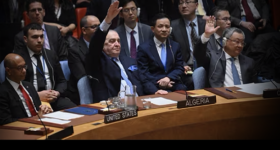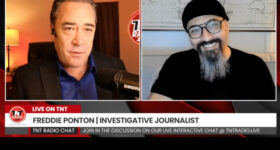Washington Post
Micheal Peel

ABU DHABI — Qatar’s al-Jazeera television station provided a great ringside seat for the “day of rage” in Cairo almost two years ago that offered the first clear sign of the threat to the rule of then-Egyptian President Hosni Mubarak.
While many western media organizations were scrambling to ramp up coverage of Egypt’s nascent revolution, al-Jazeera had gripping reports of an extraordinary protest that ended with the ruling party headquarters ablaze and the army on the streets.
Yet, mirroring the progress of the Arab uprising itself, the 16-year-old Doha-based broadcaster’s Cairo triumph has since given way to a more complicated life, as it seeks to extend its international influence by buying into the U.S. television market.
Long recognized in the Middle East for its daring and sometimes groundbreaking reporting in a politically repressive region, al-Jazeera described its purchase this week of former vice president Al Gore’s Current TV network as a “historic development” in a market where it has long coveted expansion. The station, which has a respected English language arm and is already seen in more than 260 million homes in 130 countries, plans to start a U.S.-based news channel available to 40 million American households.
While al-Jazeera is celebrating its U.S. plans, it faces tough questions about its coverage and whether it is as independent of Qatar’s autocratic ruling monarchy as it claims to be. The broadcaster is partly funded by the government of Qatar, and the country’s increasingly prominent political role in the region’s turmoils has intensified scrutiny of al-Jazeera’s coverage.
“With the Arab Spring, al-Jazeera’s reach and credibility have grown in the West,” said Jane Kinninmont, a senior research fellow in the Middle East division of Chatham House, the London-based think tank. “But certainly, it has become more criticized in the Arab world – or, at least, become seen as more politicized.”
Although the popular revolts that swept the Arab world and brought down regimes from Tunisia to Yemen have presented al-Jazeera with an extraordinary opportunity to expand its audience, they have thrown up growing problems of perception.
And while the English channel is seen as enjoying a high degree of leeway, some analysts say Doha’s foreign policy positions — including support for armed rebels in Libya and Syria — are reflected in the tone of coverage, particularly on the flagship Arabic channel. Critics say Islamist movements with which Qatar has tried to achieve good relations have received over-sympathetic attention, with airtime given to wild allegations that opponents of Egyptian President Mohamed Morsi, a former member of the Muslim Brotherhood, are agents of foreign powers.
Some observers say al-Jazeera is cautious about reporting sensitive stories in Qatar, such as the fire at a Doha nursery last year that killed 13 children and six adults, although the channel denies it was slow to cover the tragedy.
“Al-Jazeera is generally a free network, but it works within the political constraints as understood in Qatar,” said Michael Stephens, a researcher at the Royal United Services Institute Qatar think tank.
Al-Jazeera dismisses suggestions its coverage shows any bias, including toward fellow Persian Gulf states allied to Qatar. The broadcaster says that, far from following official agendas, it often sets them. “We were covering Syria, for example, long before outside governments took great interest,” it said.
It says that — while it takes a “good portion” of its funding from the Qatari state — it is a private not-for-profit company with other sources of income, such as advertising. And though Sheikh Ahmed bin Jassim al Thani, al-Jazeera’s director-general, is a member of Qatar’s ruling clan, the broadcaster says he has “no definable relationship” to the country’s ruler and is part of a “professional management who have steered Al Jazeera to success regardless of their nationalities or surnames”.
Perhaps the most unpredictable tension now facing al-Jazeera springs from Qatar’s political scene, which appears increasingly at odds with the broadcaster’s preferred image as a fearless network “dedicated to telling the real stories from the Arab street.” The Qatari authorities sentenced a poet to life imprisonment in November for insulting the emir in a widely-circulated work about the Arab Spring that criticized the “repressive elite”.
But al-Jazeera gives short shrift to the notion that its reputation might be threatened by the Qatar government’s intolerance of opposition at home. “Our journalists have never been told to cover or not cover a story due to pressure from outside this organization,” the broadcaster said.
Abeer Allam of the Financial Times in Cairo contributed to this story.
READ MORE MSM PROPAGANDA NEWS AT: 21st Century Wire MSM Propaganda Files















